An Empowering Midlife Author Interview with Jennifer Savran Kelly
Plus: Four gentle and funny speculative novels
Hi friends, and happy May—it’s finally spring in New Hampshire, season of lilacs, spring peepers, and blackflies. And now on to the next in the Midlife Authors series (find earlier entries here, here, and here).
Today’s interview is with debut novelist Jennifer Savran Kelly, the author of Endpapers (Algonquin, 2023).
Jen lives in Ithaca, NY, and works as a production editor at Cornell University Press. Jen’s debut novel Endpapers is set in 2003, in a moody New York City still grappling with 9/11, where main character Dawn, a young artist and bookbinder, is struggling to become herself. The book is a finalist for the 2024 Lambda Literary Award and was a fall/winter 2023 Indies Introduce pick; it also won a grant from the Barbara Deming Memorial Foundation and was selected as a finalist for the SFWP Literary Awards Program and the James Jones First Novel Fellowship.
Midlife Author Q and A with Jennifer Savran Kelly
Where or when did you notice the first glimmers of writing? Or to put it another way, when did fiction writing start calling to you more insistently?
I’ve always been a voracious reader. Growing up, I also loved paper and books as objects, and I dabbled in calligraphy, drawing, and journaling. But I never considered myself to be a writer because I was very focused on acting, and that’s what I studied formally.
For a few years after I graduated from college (and gave up acting, long story), I lived in Brooklyn, where it was easy to indulge my love of paper and books. I took as many papermaking, printing, and bookbinding workshops as I could through the Center for Book Arts. As I began to experiment with creating artists’ books, or works of art in book form, I also began to take myself a bit more seriously as a writer. I wasn’t writing anything like traditional narrative. It was more like fragments or tiny vignettes meant to work together with visual imagery and paper and binding. I don’t know if it was any good, but I had a ball doing it.
After a few years, I moved upstate and didn’t feel I’d learned enough to keep going seriously on my own. Looking back, I can see I just lacked confidence. But it did plant the writing bug, and it turns out that wasn’t going to let go.
Have you written fiction from the start, or did you begin with another form or genre? And if you switched, how did that come about?
After I moved upstate and slowed way down with making artists’ books, I thought I’d try my hand at a traditional short story. I’d been carrying around this idea about a young woman who becomes obsessed with fortune cookies in a religious way, because even though they’re gimmicky, they’re always positive. I wanted to explore what would happen if her positive fortunes turned more and more ominous as the story progressed. One night over dinner, I told my friend Chris about it. He’s a filmmaker and he liked the idea and persuaded me to write it as a screenplay with him.
We cowrote it as a short film and actually produced it, and we had such a great time, we made two more short films to go with it, turning the whole thing into a feature titled Invisible Ink (watch trailer for Invisible Ink here).
After that, I had a baby. My days of doing time-consuming work in my bindery and collaborating on films with so many people’s competing schedules were over, at least for the foreseeable future—and I needed a creative outlet. Even if my son only napped for 15 minutes, I could jot a few sentences in a notebook or type up a scene for a story. So I began writing fiction. No fancy bindings, no actors, no scores. Just me and my words. It was very scary, but I promised myself I was allowed to suck at it. I could learn and grow over time. And that’s what I’ve been doing.
What do you know now as a writer that you wish you’d known starting out?
I wish I’d had a stronger sense of editors and agents as human beings, with their own subjective tastes and career goals, instead of gate keepers. When I first started, I believed getting published had everything to do with talent and skill. Now, having been a writer for a decade and an editor for a short amount of time, I understand that a piece of work can be the right or wrong fit for a whole host of reasons: subjective opinion, direction of the publication or list, how many other similar things are already in the pipeline, how successfully the marketing team thinks they can sell your work to their particular market, and on and on.
I don’t mean to make it sound like talent and quality are not important. They absolutely are. But you can work on those things. You can’t, however, change the direction of a publishing imprint or an issue of a literary journal or an agent’s taste. So you have to work on what you can control, which is your writing. If you keep at it, you’ll find the people who connect with it.
What makes a midlife writer a stronger writer?
For one, the simple fact of having more life experience means having more to write about—and (hopefully) having a more complex understanding of the world, which can enrich your storytelling.
In my case, having more life experience also means having fewer fucks to give. And I mean that in the best possible way. I’m a lot less afraid now. If I want to try something new, I try it. If I want to say something, I say it. I might edit it later, but as I draft new work, I’m more interested in taking risks and failing than I am in pleasing imagined editors or readers. That part comes later, when it’s time to submit it for publication, and over the years I’ve been finding that my most successful work is the stuff I haven’t held back with.
As a midlife writer, at least when I’m feeling more balanced, I also know that “success” might look different for me than it does for a writer in their twenties. That allows me to let go of a certain amount of comparison. No matter how many goals I accomplish—attending a conference, publishing a short story in a literary journal, winning a grant, publishing a debut novel—there will always be authors who are achieving more. And this is true for everyone, by the way, even the most successful lifelong writers. Being older has allowed me to cultivate a significant amount of clarity about my own personal goals and what a successful writing life means to me. I have to remind myself of this on a regular basis, but I believe that being older makes it easier to stay focused on my own path.
Can you share your advice for someone who’s just getting started with writing, or who thinks it’s too late?
I hate to sound like a sneaker commercial, but you really have to just do it. The good news is that writing is one of the few fields that doesn’t suffer from rampant ageism; there are so many authors who published their first books later in life. You don’t need formal training; all you need are passion and perseverance. I’ve been making the whole thing up as I go—taking workshops, attending conferences, sharing work with other writers, writing terrible things that will never see the light of day. There’s no other way to do it. If you’re hungry, you’ll keep improving. If you want to get published, you’ll find the outlets that connect with your work. They’re out there!
“As a midlife writer, at least when I’m feeling more balanced, I know that “success” might look different for me than it does for a writer in their twenties. That allows me to let go of a certain amount of comparison. No matter how many goals I accomplish—attending a conference, publishing a short story in a literary journal, winning a grant, publishing a debut novel—there will always be authors who are achieving more.”

Tell us about your debut novel, Endpapers.
It’s hard to believe this is even real, but Endpapers was just shortlisted for a Lambda Literary Award! It’s about a genderqueer book conservator who finds a mysterious old lesbian love letter, setting off a search for the author who wrote it and for a meaningful life beyond the binary in early-2000s New York City.
It's 2003, and artist Dawn Levit is stuck. A bookbinder who works at the Metropolitan Museum of Art, she spends all day repairing old books but hasn’t created anything of her own in years. What’s more, although she doesn’t have a word for it yet, Dawn is genderqueer, and with a partner who wishes she were a man and a society that wants her to be a woman, she’s struggling to feel safe expressing herself. Dawn spends her free time scouting the city’s street art, hoping to find the inspiration that will break her artistic block—and time is of the essence, because she’s making her major gallery debut in six weeks and doesn’t have anything to show yet.
One day at work, Dawn discovers something hidden under the endpapers of an old book: the torn-off cover of a lesbian pulp novel from the 1950s, with an illustration of a woman looking into a mirror and seeing a man’s face. Even more intriguing is the queer love letter written on the back. Dawn becomes obsessed with tracking down the author of the letter, convinced the mysterious writer can help her find her place in the world. Her fixation only increases when her best friend, Jae, is injured in a hate crime for which Dawn feels responsible. But ultimately for Dawn, the trickiest puzzle to solve is how she truly wants to live her life.
And if you like, tell us about a recent book that you think deserves more attention.
Richard Mirabella’s debut novel Brother & Sister Enter the Forest (Catapult, 2023) is one of the most stunning books I've read. In spare, lyrical prose inspired by fairy tales, he tells the story of Justin and his sister Willa as they attempt to reconnect years after a tragic and violent incident rocked their worlds.
Justin is a gay man who as a boy was shunned and disliked by his mother and bullied at school. Then he meets his first, older, boyfriend Nick, who commits a terrifying act of violence, forcing Justin to flee—and his and Willa's lives are never the same. Mirabella unfolds both their trauma and their fraught sibling relationship with the utmost tenderness and shows us moments of pure hope.
“Having more life experience means having fewer fucks to give. And I mean that in the best possible way. I’m a lot less afraid now. If I want to try something new, I try it. If I want to say something, I say it. I might edit it later, but as I draft new work, I’m more interested in taking risks and failing than I am in pleasing imagined editors or readers. That part comes later, when it’s time to submit it for publication.”
Four gentle and funny speculative novels
Last week, I listened to the audiobook of Holly Gramazio’s debut novel, The Husbands, which tells the story of Lauren, a London thirtysomething who finds a strange man in her apartment—he’s wandered down from the attic, and he thinks he’s her husband. The novel’s premise: Lauren’s attic has become magic and keeps spitting out possible husbands. The Husbands got me thinking about some other gently speculative novels that aren’t all that concerned with the why or the how of the premise, only the what now—what will this character do in this altered reality?
The Husbands, Holly Gramazio. (4/2/24, Doubleday). The Husbands’ magic-attic premise creates a Sliding Doors/Groundhog Day mashup. Main character Lauren is in her thirties; she’s single, lonely but relatively content with her life, when she comes home to find a strange man in her apartment, a man who claims to be her husband Michael. Soon she realizes that she can reject a husband by sending him back to the attic, whereupon a new one instantly appears, climbing down the attic ladder. With each new husband, Lauren’s life has changed—the apartment’s decor changes, her job may have changed, her relationships with friends and family change. When she enters a new marriage, she sometimes encounters previous husbands, living other lives. The story sags a little in the middle, but I loved the way the novel approached some big questions, like how our relationships change us, and what we need to feel complete. And as a writer, I loved seeing how Gramazio pulled off the difficult feats of plotting, and balancing scene and summary. If you like rom-coms but get annoyed at their predictability, you’ll like The Husbands.
This Time Tomorrow, Emma Straub (2022, Riverhead). A time-travel novel with a lot of heart, a lot of grief, and a lot of love for 1990s New York City. As This Time Tomorrow opens, Alice Stern is about to turn 40, and her life is okay: She works in the admissions office of the private school she once attended, she has a boyfriend and a handful of good friends, and she’s content to live alone in her basement studio in Brooklyn. But Alice’s dad, Leonard, is dying; he’s essentially Alice’s only family, and she spends all of her free time visiting the unconscious Leonard in the hospital.
Late on the night of Alice’s 40th birthday, something mysterious happens, and when she wakes the next morning, she’s 16 years old and in her childhood home. With the help of her longtime best friend, Sam, who was with Alice on her original 16th birthday, Alice begins to puzzle out her new reality. This Time Tomorrow mashes up the premises of Peggy Sue Got Married and Groundhog Day. For more, here’s my review for BookPage.
People Collide, Isle McElroy (2023, HarperVia). A body-swapping, Kafkaesque story that explores gender, identity and how well we can know one another. On a fall afternoon, Eli arrives at his wife Elizabeth’s classroom at the end of the school day and can’t understand why Elizabeth’s boss is suddenly calling him Elizabeth. Slowly, Eli comes to understand that he is inhabiting Elizabeth’s body, even as his memories and thoughts remain his own. And, just as mysterious, he discovers that Elizabeth has disappeared. People Collide asks questions about gender, desire, marriage and family dynamics as it offers mysteries for Eli and Elizabeth to solve. For more, here’s my review for BookPage.
Faye, Faraway, Helen Fisher (2021, Gallery Books). A gentle time-slip novel that didn’t get much attention when it published in 2021. Main character Faye has a good life in London, where she’s a mother to two young daughters. She’s married to Eddie, who’s studying for the ministry, though she can’t picture herself as a vicar’s wife. She loves her friends and her career testing product designs for blind people. Still, there’s a hole in her life, left by the death of her mom when Faye was 8 years old. She describes grief “like a missing tooth: an absence I can feel at all times, but one I can hide as long as I keep my mouth shut.”
When Faye finds an old photo of her six-year-old self is sitting in an empty toy box, she’s surprised to encounter the same box later in Eddie’s study. Eddie has brought the tattered box down from the attic to fill with textbooks, but Faye returns it to the attic, feeling oddly possessive about the box. But she hits her head on a lightbulb and shatters it, stepping into the box to avoid the broken glass. That’s when she falls through time to her childhood home in the mid-1970s, where her mother is asleep, as is six-year-old Faye. The story moves back and forth between the present and the ‘70s, as Faye keeps visiting her mom and her childhood self. Faye’s voice is funny, digressive, philosophical. For more, here’s my review for BookPage.
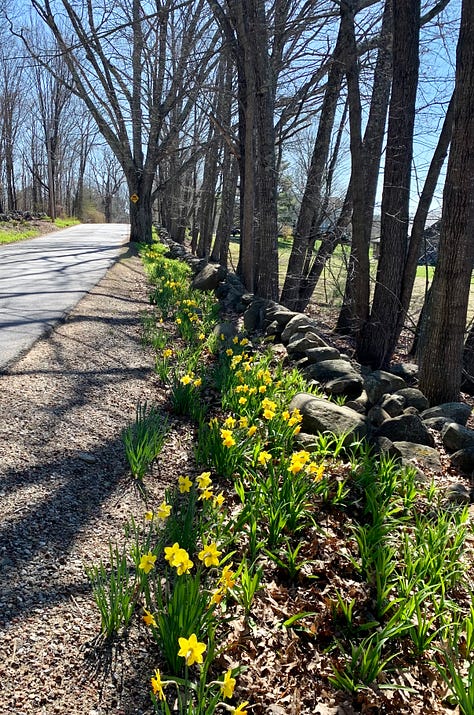


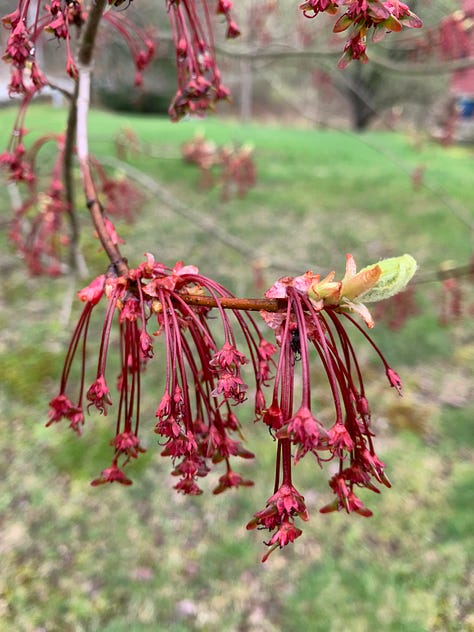
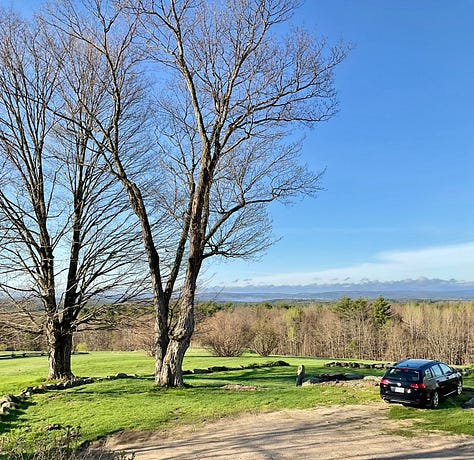
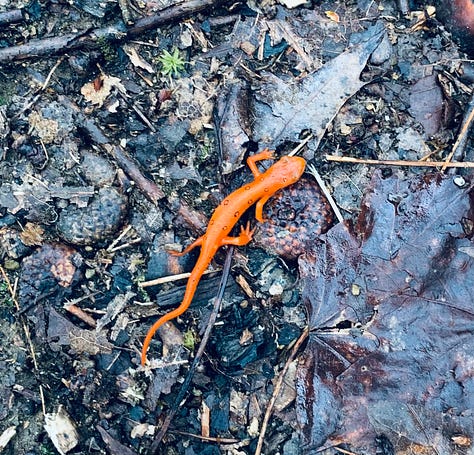

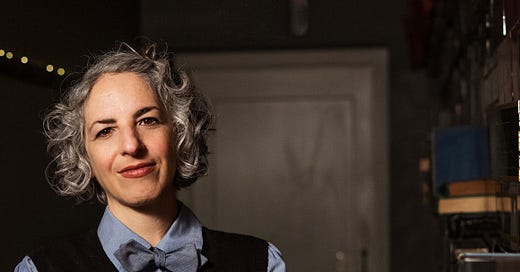



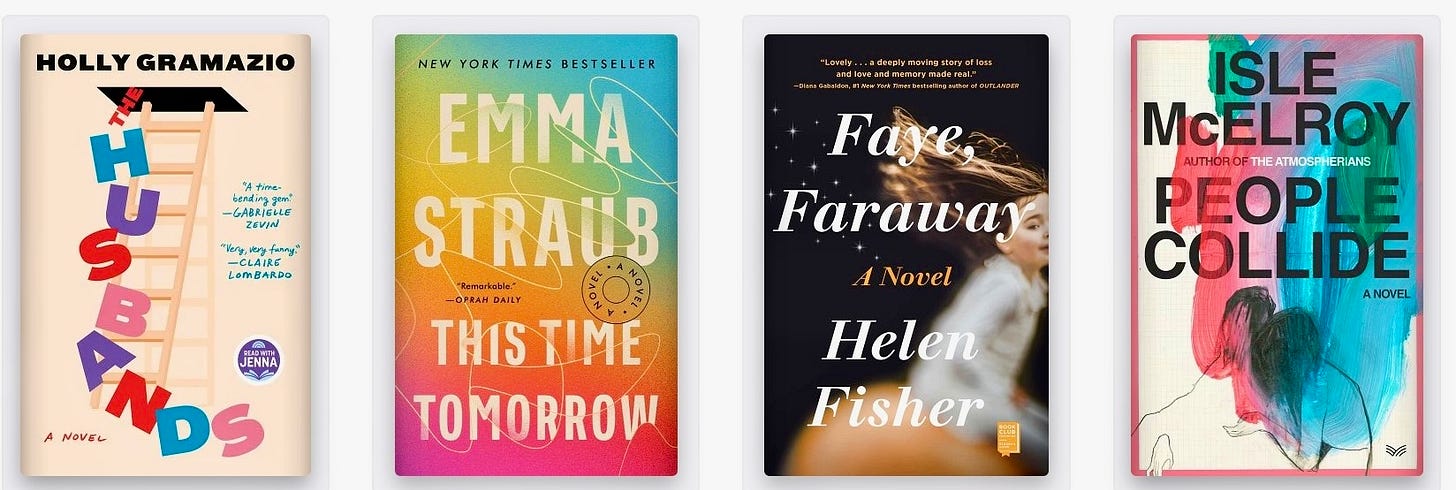

I spent four years in Ithaca and my wife's name is Dawn. 🙂 Endpapers sounds fascinating - I recently finished Hernan Diaz's Trust and really enjoyed the quasi-epistolary aspects of that novel. Jennifer's views on writing later in life is so very on point. It's already May! Time feels like it is moving faster than ever. The last thing we need is to limit ourselves in any way... I'm also a fan of the sneaker slogan, which is literally about life and death:
"Dan Wieden, cofounder of the advertising firm Wieden and Kennedy, revealed the phrase was inspired by the final words of a death row inmate who was facing execution and said, "You know, let's do it." "I remember when I read that I was like, that's amazing." (https://en.wikipedia.org/wiki/Just_Do_It)
Love this! I started writing in my 40s and am working on my first novel. This is so inspiring and encouraging. Thank you!